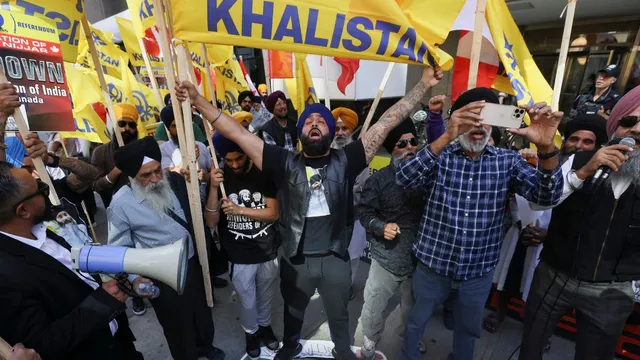- By Supratik Das
- Tue, 25 Nov 2025 08:27 AM (IST)
- Source:JND
Canada Khalistani Attack: An unofficial “Khalistan Referendum” organised by the banned group Sikhs for Justice (SFJ) in Ottawa on Sunday triggered a sharp diplomatic tremor after videos emerged showing the Indian national flag being desecrated and aggressive “kill” chants raised against Indian leaders.
The event, held at the McNabb Community Centre, drew thousands of Canadian Sikhs despite sub-zero temperatures, icy winds, and persistent snowfall.
Massive Turnout, Slogans Raise Alarm
Supporters carrying yellow Khalistan flags queued for nearly two kilometres, forming long lines that stretched around several blocks. SFJ claimed more than 53,000 Sikhs from Ontario, Alberta, British Columbia, and Quebec participated in the non-binding ballot, which asked voters whether they supported the creation of a separate state called “Khalistan.”
Throughout the day, videos circulated on social media showing participants chanting incendiary slogans, including calls for violence against Indian officials. Police liaison officers present outside the venue were seen observing but not intervening.
Footage released by Alberta-based outlet Media Bezirgan captured the crowds, the chants and the moment the Indian flag was reportedly insulted at the conclusion of the event. SFJ’s general counsel, Gurpatwant Singh Pannun, designated a terrorist by India, addressed the gathering through a satellite message.
India’s Envoy Says ‘Farcical Referendum’ Misleads Public
Reacting sharply, India’s High Commissioner to Canada Dinesh Patnaik said that while peaceful protests are part of any democratic process, the glorification of violence and the display of images showing the assassination of former Indian leaders cannot be dismissed as harmless expressions.
In an interview with CBC, Patnaik said, “You know what a referendum is and what it is not. This is a farcical referendum. If someone wants to ask for something peacefully, that is acceptable. But displaying pictures of suicide bombers and assassins is not.”
He added that allowing such events in Canada creates serious perception issues in India:
“People back home see this as Canadian interference in Indian affairs, just as Canadians would object if another country encouraged separatism in Quebec.”
Canada-India Ties Under Spotlight Again
The development comes at a sensitive time, with New Delhi and Ottawa attempting to rebuild ties after months of tension. The event also coincided with Canadian Prime Minister Mark Carney’s brief meeting with Prime Minister Narendra Modi on the sidelines of the G20 Summit in South Africa. SFJ used this timing to cast suspicion, even as Canada maintained that such meetings are routine diplomatic engagements.
Despite the controversy, voting continued beyond the scheduled 3 pm deadline to accommodate the long queues, with families, ranging from newborns in strollers to elderly citizens on walkers, waiting for hours to cast their ballots.
New Delhi has repeatedly urged Ottawa to curb extremist activity targeting India. The Sunday referendum, the latest in SFJ’s series of such exercises across Canada and Europe, once again highlighted the divide between Canada’s expansive free-expression framework and India’s national security concerns, an issue that continues to shape the bilateral relationship.

